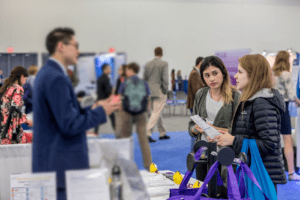 Given the tremendous contribution of private sector research to human genetics and genomics research advances, ASHG is affirming the Society’s intent to welcome and engage industry members in the Society’s membership. In April, the Board approved recommendations from an appointed Industry Engagement Task Force (IETF) that will encourage the Society’s work to highlight and incorporate the experiences, voices, and science from members working in industry.
Given the tremendous contribution of private sector research to human genetics and genomics research advances, ASHG is affirming the Society’s intent to welcome and engage industry members in the Society’s membership. In April, the Board approved recommendations from an appointed Industry Engagement Task Force (IETF) that will encourage the Society’s work to highlight and incorporate the experiences, voices, and science from members working in industry.
Danjuma Quarless, PhD, a computational biologist at AbbVie and member of the IETF, says industry members are excited to engage more deeply with the Society and relevant activities because “we share the same passion for genetics as any other professional sector,” he said. “Experiencing industry members’ excitement and potential contributions to the Society is inspiring, and I am confident that this attitude is only increasing as the field grows. Participation from all workforce sectors throughout the Society is critical because diversity of ideas, perspectives, and experiences are necessary to advance scientific discovery. As a community, we must tackle tremendous scientific challenges. Effectively working together will only accelerate our impact on the genetics and genomics fields, and ultimately the entire healthcare field.”
ASHG’s recent report “The Economic Impact and Functional Applications of Human Genetics and Genomics,” documented the breadth and impact of commercialization and application of genetics and genomics tools and technologies for human health and disease. The segment of ASHG members who work in this sector is sizable, making up over 10% of ASHG’s membership. Given this, the ASHG Board of Directors created the member-led IETF in October 2020 and charged the group to provide advice on opportunities and challenges around enhancing engagement of industry in ASHG activities. This action was built on past Board affirmations that all high-quality science from all sectors should be welcome in ASHG programs and venues, while it has also acknowledged the Society must manage issues such as appropriate conflict of interest disclosure and restrictions around continuing medical education programming.
Soma Das, PhD, an ASHG Board member and a member of the IETF, says with the growth of genetics and genomics and the applications of tools and technology in the commercial sector, more and more genetic professionals are working in industry. “It is important that the ASHG community encompasses these genetic professionals who represent an important facet of the genetics community,” she said.
The work of the IETF has led to an exciting new potential for greater inclusion of industry voices in ASHG programs and activities. Although programs will build over time, involvement of industry members in programs and activities will be beneficial, Das said, as their viewpoints and inputs are considered which will broaden the scope of such programs and activities. “It will also result in another facet of increased diversity that is important for ASHG,” she said.
From discussions with industry stakeholders and surveys of members who work in industry, the task force identified barriers to industry’s acceptance and inclusion in the Society as well as the genetics and genomics research community at large. The Board reviewed and approved the resulting proposed action plan, which seeks to make ASHG more inclusive and welcoming to those working in industry. The activities will be guided in the long-term by the Society’s Membership Engagement Committee.
Quarless said his intention for joining the IETF has been to improve understanding within the ASHG community of industry professionals’ motivations, perceptions, and attitudes. “A personal goal is to have this specific professional sector be viewed more positively, and I believe that the Task Force is making significant progress toward that goal,” he said. “Ideally, the Task Force’s output will help foster an inclusive and welcoming professional society for the entire genetics and genomics workforce.”
The IETF Action Plan includes the following activities in which the Membership Engagement Committee will help the board prioritize and undertake these activities over a three- to five-year period:
Member Engagement
- Enhance industry member visibility and encourage industry careers within ASHG communications.
- Expand representation of industry members within the ASHG Board and committees.
- Regularly evaluate ASHG’s efforts through member surveys to inform development of effective policies, procedures, and training.
Year-Round Programming
- Incorporate industry speakers, topics, and careers within ASHG year-round programming, including webinars, podcasts, Annual Meeting sessions, and the ASHG Career Center.
- Hold annual career fairs that highlight industry career opportunities in addition to academia and government.
- Develop year-round networking opportunities between and amongst members working in academia, industry, and government through, for example, ASHG Connect, the Society’s new online member community with an open community specifically for industry scientists.
Diversity & Inclusion
- Enhance the inclusion of industry members in workforce diversity initiatives, such as the Human Genetics Scholars Initiative and Developing Country Awards.
- Develop collaborations with academia, industry, and government to enhance workforce and research population diversity, equity, and inclusion.
Public Awareness
- Highlight industry and industry member contributions to the society and economic impacts of human genetics and genomics research.
- Develop collaborations with academia, industry, and government to increase public awareness about the benefits of human genetics and genomics research.
Other Activities
- Build relationships with industry members and organizations through participation in the NASEM Genomics Roundtable.
- Develop a corporate advisory group (or similar program) that helps ASHG better understand issues facing industry within the field.
